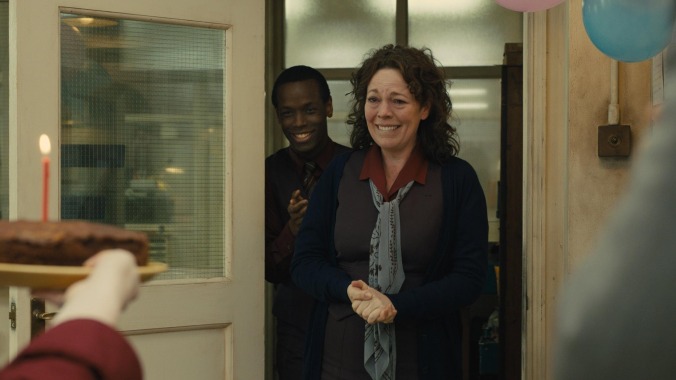Empire Of Light review: Olivia Colman shines bright in a nostalgic ode to cinema
Colman leads a strong cast, but Sam Mendes' ambitious take on faded theaters, star-crossed romance, bipolar disorder, and 1980s Britain yields mixed results

The opening montage of Empire Of Light includes a gasp-worthy demonstration of the power of, well, light. Writer-director Sam Mendes is capturing the faded beauty of the Empire Theatre, a cinema on England’s southern coast, in 1980. Suddenly its shabby lobby, peeling-paint walls, and stale popcorn behind the concession stand are all basking in a honeyed glow. Rejoice, film nerds, because world-class cinematographer Roger Deakins is back, and his ambers and golds warm the recesses of production designer Mark Tildesley’s extraordinary theater, making this venue—even illumination itself—the stars of this show.
Or they would be if the top-billed actor here wasn’t Dame Olivia Colman (okay, not a dame, but surely it’s only a matter of time). She plays middle-aged Hilary, a devoted Empire employee with a troubled history, a role clearly written with her strengths in mind—or perhaps she just has strengths in every role. Mendes lets Colman weave together the everyday relatability of her Broadchurch character with the shrewd anger of her The Lost Daughter performance with, eventually, even the manic hilarity of her Queen Anne in The Favourite. It’s no wonder the Oscars, Emmys, and BAFTAs keep calling her; if a central thesis of Empire Of Light is that 24 frames per second can generate magic, Colman is walking (and crying, and dancing, and smiling) proof of that.
We meet Hilary as she’s going through the motions of her uneventful life: routine check-ups with a doctor indifferently prescribing lithium, ballroom dance classes for fun that feel similarly prescribed, and breezy walks between her flat and longtime place of employment. Its staff of ushers, ticket takers, and concession sellers (including Tom Brooke and Hannah Onslow), and even the crotchety projectionist (Toby Jones), are a kind of makeshift family for Hilary, although their manager Mr. Ellis (Colin Firth) continues a casually inappropriate relationship with her. The arrival of new hire Stephen (Michael Ward), a young Black man with dreams of becoming an architect, at first serves to draw Hilary out of her funk. But especially after spending New Year’s Eve together watching fireworks atop the cinema and sneaking away to explore its abandoned upper floors, an unlikely romance blossoms.
The aforementioned splendor of Deakins’ lighting, illuminating Tildesley’s faded art deco glory (renovations of a real cinema-ballroom!), all set to Trent Reznor and Atticus Ross’ mesmerizing music (plus jolts of Bob Dylan and Joni Mitchell)—it’s more than enough ambiance to ignite Hilary and Stephen’s humble spark. Let its sights and sounds wash over you and Empire Of Light is almost aesthetically immersive enough to distract from the imbalance between their stories; Mendes fails to give Stephen’s coming of age the same weight he gives Hilary’s mental health setbacks, journey toward self-acceptance, and discovery of systemic racism, instead coming close to turning him solely into a vehicle for that discovery. As their fling winds down, Stephen’s mother Delia (Tanya Moodie, doing a lot with a little) muses that he’s “lived a little bit of life,” which only lays bare how little we know of Stephen. Ward doesn’t manage to show us that apparent maturation, despite having almost as much natural charisma as Colman. Their best scenes together are ones filled with quiet and stillness.
More often, Mendes creates so much ground for his script to cover: star-crossed romance, the 1980s rise of racist nationalism under Thatcherism, bipolar disorder, intergenerational trauma, and, of course, the power of “that little beam of light,” as one character puts it. A wizened Jones gets to deliver this cinematic ode to cinema’s requisite monologue, singing the praises of the machinery in his projection room that tricks our eyes and ears. Maybe it’s fitting that in a movie like this, such speeches show their gears turning, too; scenes often begin with no sense of the dialogue that preceded it, like you can imagine the director calling “action” moments ago.
The freeing moment Hilary decides, after frequently dismissing the idea, that she will finally actually watch a movie at the Empire feels similarly disconnected from the drama just before it. Is this her surrendering to an unjust world’s chaos? Or the resolution of her feelings for Stephen? Or just a YOLO epiphany? Mendes the director is more like a time traveler, gifting us a depiction of time and place so vivid it must be remembrance. But Mendes the first-time solo writer juggles too many disparate story elements, and the nagging sense they should cohere makes it all the more perplexing that they don’t.
Without the help of a leading actor preternaturally attuned to breathing life onto the screen, we wouldn’t see this puzzle’s overall picture—even though it’s clear Mendes has all the pieces. Other films from filmmakers mining autobiographical inspiration, like the recent Armageddon Time and The Fabelmans, balance what must surely be cathartic storytelling for the filmmaker with accessibility, catharsis for us—not to mention entertainment. Its specifics are sharp and certainly pleasant to experience, but without that universality, Empire Of Light risks foregrounding the empty aesthetics that some refer to as Oscar bait.